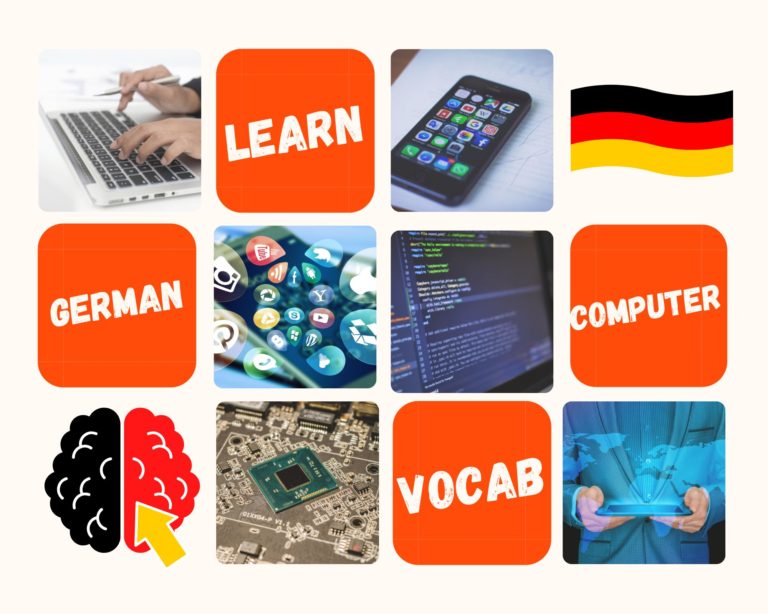
You want to learn German, but there’s so much information online. How do you know where to begin? Is it even possible to learn German on your own? German isn’t that hard to understand for English speakers, but you need the right strategy. A better question to ask is, “How hard is it to teach myself how to learn German?”
You may have already gone through multiple language-learning attempts, only to get stuck at a certain point and give up. Learning should be a fun, immersive, and interactive process, not a chore. Below are my tips for beginning your German language experience on the right foot. You’ll find out how to assemble a game plan for learning German vocabulary, grammar, and pronunciation without growing gray hair.
Is It Hard to Learn German Vocabulary?
As an English speaker, you already know an incredibly complex language, although you may not realize it. English has almost 500,000 words! But, German only has around 135,000.
There’s more good news. Most of us use about 3,000 words to say 95% of what we want to communicate, and you can get away with even fewer words in German. By learning the 1,000 most common German words, you’ll have a vocabulary expansive enough to start talking.
You might think 1,000 words sounds like a lot, but it gets even easier! Cognates, Words That are the Same in German and English only differ in pronunciation. Other terms are very similar to their English counterparts, changing only a few letters in translation.
Is It Hard to Speak German?
One of the most delightful aspects of learning to speak German is that all the words are pronounced the way they’re spelled. That means, if you know what sound each letter makes, you automatically know how to say all the words.
On the other hand, the English language has silent letters, sound-changing vowels, and a myriad of exceptions. You won’t have any of this nonsense in the German language. What you see is what you get or what you pronounce in this case.
A typical misconception is that you can’t learn to talk German without a native speaker. However, you don’t have to live in a German-speaking country to start speaking German. You can learn to speak German by yourself. How to Speak German: Basic Pronunciation Guide (coming soon!)
Is It Hard to Learn German Grammar?
One of your most pressing concerns probably has to do with German grammar. You’re dealing with noun genders, case systems, present, past, and future tenses. If you haven’t even mastered English grammar, how should you understand these concepts in a foreign language?
Luckily, German grammar is very methodical, and you’ll rarely encounter exceptions to any rules. You can learn basic German grammar by breaking it down into manageable tidbits. The next step is to study concepts in a logical, sequential order. Each lesson should build upon the knowledge that you learned in the previous exercises.
Learning German grammar will require a time commitment on your behalf, but the exercises, worksheets, and practice materials don’t have to be boring. They should include the occasional cheatsheet or shortcut.
More German Grammar tips are coming soon! Brush up on your language skills with my Grammar Review for Learning German in the meantime.
Learn German in 5 Steps
Preparing yourself to go on an exciting language journey is the best way to start learning German. Learning the German language doesn’t have to be difficult. Set yourself up for success using the steps below.
1. Make it Personal
First, you need to know your “why” for learning German. What’s your reason for learning the language, and how can it improve your life?
- Skip the first year of a second-language requirement at a University
- Communicate with long-lost family or friends
- Move forward with your career
- Connect with German influencers
- Read literature in the German language
- Live and work in Germany
- Study abroad in Germany for free
- Rediscover the Internet
- Play video games with German-speaking companions
You may have your own unique reason for wanting to learn German. As long as the purpose is motivational for you, you’re already on the right track.
2. Learn Smarter, Not Harder
Sure, you could start memorizing vocabulary terms and studying grammatical rules from multiple different sources. But, how long can you stick with this curriculum before it becomes overwhelming or tedious?
Learning German is a marathon race, not a sprint. Before you start diving into the details, figure out what you want to learn in German. You don’t need to study aspects of the language you won’t use, but you should have clear, achievable goals.
If your goal is to speak everyday German, you don’t necessarily need technical, medical, and scientific terms. The same process of elimination works on a smaller scale. For example, by learning the 1,000 most common German words (Coming soon!), you’ll be ready to start conversing in German about many of the topics that interest you.
3. Find Practice Opportunities
There are simple ways you can start talking and using German without leaving the comfort of your home.
- Start with children’s books
- Watch German movies, TV, and other video content
- Explore language learning apps
- Listen to music from Germany
- Find a language buddy online
- Check out Social Media groups for learning German
- Turn on the German subtitles while streaming your favorite shows
- Listen to podcasts
- Cook German recipes
Combining your German practice with other activities that you enjoy can help you learn the language in a goal-oriented way. When you’re first starting to learn, it’s not necessary to understand every single word. In fact, there could be many times when you don’t even understand the context.
Instead, focus on words that you recognize and can easily absorb without overexerting yourself. For example, let’s say you’re watching a film online in English with German subtitles. You notice the German word for a test drive at the bottom of the screen is “Testfahrt.” You and your friend start laughing about what the word sounds like in English. Positive, emotional-connected experiences like those will help you absorb vocabulary with minimal effort.
4. Learn About German Culture
Learning German isn’t just about translating sentences word for word back into your native English language. Part of learning a foreign language is understanding the culture of the countries that speak it. German, Austrian, Swiss, and other cultural influences have shaped how the language is used.
Be prepared to discover that German isn’t the most expressive language. You’re probably wondering what I mean. The English language is pretty flexible, allowing us to invent our own words and communicate the most subtle details using our speech. In contrast, German is a very straightforward language. You’ll need to say what you mean and mean what you say.
If you incorporate German culture into your studies, you’ll have a better idea of how you can use the new words, phrases, and grammar in practice. For example, you could gain a better understanding of when to address someone formally or informally.
5. Have Patience and Enjoy the Process
Learning German doesn’t happen overnight, but small and regular practice sessions can add up fast. Before you know if, you could find yourself speaking your first German sentences and amaze yourself with how many words you recalled. If you’re following the four previous steps, you’ve already laid the foundation for a promising start on your German language journey.
Final Thoughts
You can learn German on your own, online, with a German Language Coach, or a combination of strategies. By structuring your learning plan beforehand, you can significantly improve your ability to comprehend the language quickly.
Sign up for my newsletter and be the first to receive new German tips and tricks. I’ll also give you a head’s up when my Basic German Course is ready! My thoughtfully-designed course leverages modern language learning techniques and gives you the formula you need to start speaking German fast.







good job!